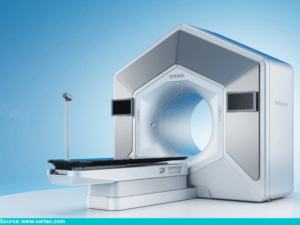Adaptive radiation therapy (ART)

Adaptive radiation therapy (ART) uses sophisticated software in order to continually monitor and modify the radiation dose delivered to a patient’s tumor throughout the treatment. This method keeps radiation exposure to healthy tissues to a minimum while allowing doctors to treat cancer with radiation more precisely.
India’s renowned radiation oncologist, Dr. Sridhar PS, explains, “Adaptive radiotherapy (ART) takes into account changes in anatomy as well as variations from the expected provided dose caused by deviations in either patient setup or machine delivery to predict the actual dosage that is to be delivered to the patient as the treatment advances.”
Dr. Sridhar Papaiah Susheela provides Cyberknife treatment in India. He currently practices at Apollo Hospital, Bangalore and as well as available at Proton Cancer Center, Chennai.
Ethos Adaptive Radiation Therapy
Ethos Adaptive Radiation Therapy is a breakthrough technique in which Artificial intelligence works in tandem with adaptive radiation therapy to produce adaptive intelligence. Ethos therapy is a holistic approach powered by artificial intelligence that aims to improve radiotherapy’s capacity, adaptability, and effectiveness. This comprehensive, ground-breaking new therapy is patient-centric and individualized from the planning phase to on-couch adaptation and therapy monitoring.
The system, powered by artificial intelligence technology, gives a real-time image of a patient’s anatomy and enables the radiation dosage to be adjusted in real-time to the tumors and normal tissue that are continuously changing locations and shapes.
According to radiation specialist Dr. Sridhar PS, “Ethos treatment makes it easier to administer doses to the intended target, helps to protect vulnerable organs, and allows for customizable margins that help to significantly lower toxicity.”
Conventional radiation therapy v/s Adaptive radiation therapy
In conventional radiation therapy, a preset dose of radiation is administered over a predetermined amount of time to a particular part of the body. The location, size, and shape of the tumor, along with the patient’s general health and other factors, are typically taken into account while developing the treatment plan. Once a treatment plan has been established, radiation is administered using specialized tools, such as a cobalt machine or a linear accelerator.
In contrast, the administration of radiation to a tumor is continuously monitored and altered during the course of adaptive radiation therapy (ART). This approach allows doctors to target cancer more precisely with radiation while minimizing the exposure of healthy tissues.
Adaptive radiation specialist Dr. Sridhar P S says, “We construct precise 3-dimensional images of the tumor and surrounding tissues using sophisticated software and imaging methods, like magnetic resonance imaging (MRI) , computed tomography (CT) or HCT to administer Adaptive radiation therapy.”
He adds, “The amount, intensity, and placement of the radiation to the tumor are all specified in the treatment plan created using these images. Then, a computer-controlled system uses a linear accelerator device to deliver the radiation to the tumor in accordance with the treatment plan.”
Book an Appointment
Types of cancer that Ethos Adaptive Radiation Therapy can be used to treat
The clinical application of adaptive radiation is a relatively recent breakthrough in the battle against cancer, and medical experts are still trying to figure out how and when they should implement it.
That said, research indicates that adaptive radiotherapy has the potential for treating a range of cancers, such as:
- Bladder cancer
- Brain tumor
- Cervical cancer
- Head and neck cancer
- Lung cancer
- Pelvic cancers
- Prostate cancer
- Rectal cancer
Advantages of Ethos Adaptive Radiation Therapy
Radiation specialist Dr. Sridhar P S says, “Ethos Adaptive Radiation Therapy is an innovative approach to radiotherapy that entails customizing the course of care to the unique features of a patient’s tumor or cancer.”
Compared to conventional radiation therapy, which involves fixed-dose radiation, it offers the following benefits:
More precise targeting of the tumor: Adaptive radiation therapy enables the radiation to be directed more accurately to cancer, lowering the chance of adverse effects on the surrounding healthy tissue.
Improved tumor control:Adaptive radiation therapy allows for treatment adjustments based on the tumor’s reaction to radiation, thereby making it more effective at slowing the growth of tumors.
Reduced treatment time: Adaptive radiation therapy may need fewer and shorter treatment sessions, making it more convenient for the patient.
Improved quality of life:Adaptive radiation therapy may help to improve the patient’s quality of life while undergoing treatment by decreasing the exposure of healthy tissue to radiation, thereby reducing side effects.
Cost-effective: Because adaptive radiation therapy is better at managing the tumor and requires fewer total treatment sessions, it may be more economical in the long term.
Is Ethos Adaptive Radiation Therapy safe for patients?

Cancer expert Dr. Sridhar P S says, “The user-friendly Ethos therapy design includes a thorough safety system to ensure you are at rest, confident, and comfortable throughout every phase of your treatment.” Compared to rest it has Minimal
However, like any medical procedure, adaptive radiation therapy has possible dangers and adverse effects.Some side effects may include fatigue, skin irritability, and modifications in bowel or bladder function. But these are temporary and go away following the course of treatment.
It is essential to discuss the potential risks and side effects of adaptive radiation therapy with your medical team, as well as any concerns you may have about the treatment. They can provide more information about the specific risks and side effects associated with your customized treatment plan.
Why choose Ethos Adaptive Radiation Therapy?
According to radiation specialist Dr. Sridhar P S, “Clinicians have long desired the capacity to modify radiation regimens in response to evolving patient anatomy. While a patient is on the treatment couch, Ethos employs artificial intelligence (AI) and machine learning to construct contours and generate customized plans for doctor approval in minutes.”
An increasing number of cancer patients are choosing this line of treatment because of its fresh and patient-centric approach and other qualities like:
- It removes barriers to adaptive therapy and enables oncologists to adapt treatment plans according to the anatomical changes in their patients.
- The 3-dimensional diagnostic quality images enable them to view the target and critical areas.
- The decision-making is simplified due to the help of AI.
Frequently Asked Questions
Ethos therapy is a ground-breaking novel treatment that enables daily tailored patient care to respond to changes in the shape and size of the radiation target and normal tissue.
Radiation specialist Dr. Sridhar P S explains,“Ethos therapy gives radiation oncologists a set of effective and powerful, yet straightforward tools that help them accomplish their goals for each patient, every single day. They can quickly modify the treatment strategy based on changes in the patient’s anatomy that they can view with diagnostic clarity.”
The Varian EthosTM therapy machine is a comprehensive, AI-driven solution created to improve the capability, adaptability, and effectiveness of radiotherapy. In a typical 15 – 30 minute treatment time slot, this machine can give an adaptive therapy, a treatment strategy that carefully considers daily changes in the tumor and normal anatomy.
Dr. Sridhar P S, Head of CyberKnife Treatment at HCG Hospitals, continues to revolutionize the treatment for cancer patients in India with this novel Varian EthosTM therapy machine, which is accessible at HCG’s leading cancer care hospitals.
Dr. Sridhar PS is an expert in high-precise radiation techniques that minimize side effects while pinpointing malignancies with incredible precision and accuracy. He is a highly esteemed radiation oncologist in India, excelling in expertise, knowledge and abilities.

